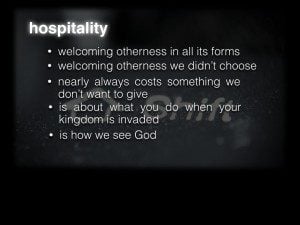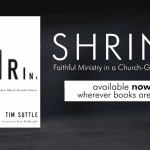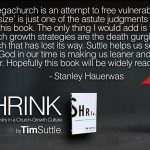When I hear the word hospitality, I immediately think of the hotel industry. The word has many associations in our society. Good service at your favorite restaurant, friends for dinner, your mom or grandmother, hospitality can mean many things to us. But I don’t think I realized until seminary that it holds a very specific theological meaning.
Hospitality is a word that theologians have come to use in order to describe something that is deeply imbedded in the gospel story. It’s not always spelled out in the scriptures, but it’s always there. Not hospitality as in receiving company, but hospitality as a posture in which we make space in our lives to “welcome otherness in all of its forms.” Other people, ideas, races, genders, nationalities, & ideologies… hospitality is making space for those things, welcoming them. It’s a posture of receiving— that is relational.
All throughout the scripture this is a HUGE question: “To whom should we extend our hospitality as the people of God? (or not).” Sometimes YHWH treated them like children—restrict friendships. Sometimes he’d push them to extend hospitality to everyone.
Now, hospitality seems obvious—but it’s incredibly difficult to do, in part because there’s a twist to making space for otherness in all its forms. Because some of its forms are annoying!
I mean, everybody’s a little bit crazy at one time or another. Sometimes they bring their crazy to your front door!
Remember those Dave & Buster’s commercial’s where a guy would pick up his girlfriend for a date & he brings his fun? Watch this & see if it rings a bell.
So imagine folks showing up in your life not with their “fun” but with their “crazy.” Hospitality is finding a way to accommodate it. So it’s nearly always inconvenient. So hospitality isn’t just having friends you enjoy over for dinner. Hospitality also involves “welcoming an otherness we didn’t choose.”
You don’t get to choose who God will bring into your life & ask you to show kindness & hospitality to.
And, even the ones you do get to choose, like your spouse… a couple years in you’re inevitably thinking “where’d this crazy person come from?” And, by the way, they’re thinking the exact same thing about you.
Hospitality cannot be practiced on our own terms. Hospitality “nearly always cost something we don’t want to give.” We will have to make space for someone else’s crazy. Our scripture for today is one of the most famous stories of hospitality in the bible.1 Kings 17, starting in verse 1
1 Now Elijah the Tishbite, of Tishbe in Gilead, said to Ahab, “As the Lord the God of Israel lives, before whom I stand, there shall be neither dew nor rain these years, except by my word.” 2 The word of the Lord came to him, saying, 3 “Go from here and turn eastward, and hide yourself by the Wadi Cherith, which is east of the Jordan. 4 You shall drink from the wadi, and I have commanded the ravens to feed you there.”
5 So he went and did according to the word of the Lord; he went and lived by the Wadi Cherith, which is east of the Jordan. 6 The ravens brought him bread and meat in the morning, and bread and meat in the evening; and he drank from the wadi. 7 But after a while the wadi dried up, because there was no rain in the land. 8 Then the word of the Lord came to him, saying, 9 “Go now to Zarephath, which belongs to Sidon, and live there; for I have commanded a widow there to feed you.” 10 So he set out and went to Zarephath. When he came to the gate of the town, a widow was there gathering sticks; he called to her and said, “Bring me a little water in a vessel, so that I may drink.”
11 As she was going to bring it, he called to her and said, “Bring me a morsel of bread in your hand.” 12 But she said, “As the Lord your God lives, I have nothing baked, only a handful of meal in a jar, and a little oil in a jug; I am now gathering a couple of sticks, so that I may go home and prepare it for myself and my son, that we may eat it, and die.”13 Elijah said to her, “Do not be afraid; go and do as you have said; but first make me a little cake of it and bring it to me, and afterwards make something for yourself and your son. 14 For thus says the Lord the God of Israel: The jar of meal will not be emptied and the jug of oil will not fail until the day that the Lord sends rain on the earth.”
15 She went and did as Elijah said, so that she as well as he and her household ate for many days. 16 The jar of meal was not emptied, neither did the jug of oil fail, according to the word of the Lord that he spoke by Elijah.
Israel had been living in the Promised Land for quite some time when Ahab became the king. He was not faithful to God. Not only was he leading the people astray in their worship, he went and married a pagan woman, Jezebel, and he bankrolled her worship of pagan gods. So God was not pleased with Ahab & sent Elijah to tell him about it. Elijah said, “YWHW’s is displeased w/you & is sending a drought.”
And then God says to Elijah, “Pssst, Elijah… you better run. Hide out by the Wadi Cherith.” This is Elijah’s home region so he’s got friends, & it’s familiar to him. But what makes it interesting is the detail “East of the Jordan.” God sends Elijah across the Jordan, out of the Promised Land. The Wadi Cherith is back in the wilderness where they came from.
Then comes the plot twist—the Wadi dries up & Elijah’s sent to Zarephath. Now this move is even more odd. For one thing, Zarephath is in Sidon, which is where Jezebel’s from. In fact, Jezebel’s father is the king of Sidon, it’s where she grew up—it’s densely populated, they are all pagans. I mean, this is not an easy place for a Jewish prophet to hide out.
So, one begins to see that the moves God has Elijah making here all have some sort of symbolic meaning. For instance: It says Elijah was fed by ravens. This is odd. For one thing, ravens are considered unclean. You don’t eat from ravens. For another thing, ravens are birds of prey. Usually birds of prey are a sign of judgment (they peck eyes out & steal food). But God sends ravens to care for Elijah.
Another part of the story w/symbolic meaning is that the Wadi Cherith dries up. This explains why God moved Elijah out of the Promised Land. In the ancient world gods were attached to the land. And this land that he sent Elijah to belongs to Baal. Baal is the rain god; he has 1 task: keep the spigot running. So God sends Elijah off to the land of Baal during the drought. But apparently Baal is not able to do his part. God has to do it for him…
So God sends Elijah to a widow. The poorest & most vulnerable people in the ancient world are widows. They’re the 1st to die in times of drought. And this widow has a son to care for, makes it tougher. They don’t have the resources to take care of Elijah. “I have nothing baked, only a handful of meal in a jar, & a little oil in a jug; I am now gathering a couple of sticks, so that I may go home and prepare it for myself and my son, that we may eat it, and die.”
To really get the hospitality of this woman you have to put yourself in her place. Her life has not gone the way she hoped it would go. Her husband has died, and left her a son to feed & apparently no means with which to do it. She’s getting ready to make a last meal before she watches her only son die of starvation. But when this widow who is on the verge of starving to death—literally making her last meal—is asked by God to show Elijah hospitality all she’s given is some sketchy promise about how the last bit of oil & flour will spontaneously reproduce.
I don’t know about you but I believe I would react w/some measure of hostility. But this widow extends hospitality to Elijah, feeds him. The next day she goes to look and there’s still just a little oil & flour. And the next day, and the next day. Scholars say it could have been as long as 3 years.
I’m not sure I’d be up for this. Seriously, if someone wanted to live off me for a few years & I was literally starving to death, I’d say “I’m sorry, but I can’t help you.”
But hospitality is like this: it can’t be practiced on our own terms. True hospitality nearly always costs us something we don’t want to give. Making space for otherness in all of its forms is Costly. Or it will deprive us in some way. Especially when we are barely making it already.
 The problem is (and again this is what the Genesis story of Adam & Eve & the fracturing of those essential relationships is trying to describe), the problem is our natural bent is toward hostility not hospitality.
The problem is (and again this is what the Genesis story of Adam & Eve & the fracturing of those essential relationships is trying to describe), the problem is our natural bent is toward hostility not hospitality.
I wouldn’t take in a complete stranger. Even less if it was a prophet of a foreign religion.Even less if I was a vulnerable widow w/a son. Even less if we were about to starve. My reaction would probably not be hospitality; it would be more like hostility.
This is exactly why God will continually call me back to a place of hospitality, right? Until I learn to not be hostile. Because those two things cannot live tougher in the same place… I’ll need to learn to SHIFT.
A few years back we studied this book as a church called A Good Life by Robert Benson. We brought the author in to speak to the church. In that book he talks about the concept of “Namaste,” which comes from Eastern traditions. You clasp hands, bow to another person and say Namaste.
Benson says what that practice means is: “The part of the living God that lives and breathes in me, bows in reverence before the part of the living God that lives and breathes in you.” P53 He points out this is a deeply Christian idea…this awareness that God has made his home in your heart. I should have reverence for that (even when you bring your crazy). Namaste is a practice of recognition.
So I taught this practice to my kids. We’ve been doing this since they were really little. I wanted it to be a natural part of our day, so every time they’d get out of the bath when they were little guy’s, I’d throw a towel around their shoulders & we’d fold our hands and bow to one another & say Namaste. Lewis, my youngest, never stopped. Nick will do it now and then, but Lewis is like clockwork… every single night.
Fast forward about 5 yrs. Lewis is an energetic & squirrely kid, and shower time is now lets see how far we can push dad until he snaps time. And I’m not proud of it, but every now & then I become, shall we say, “hostile?” I find myself saying things like, “Hurry up or I won’t let you shower for a week, and you’ll smell bad, and won’t have any friends.” (don’t say this to your children
The problem is this. Every time I lose my temper and grouse at my son, he gets out of the shower. Then I throw a towel around him & we have to bow to one another & say Namaste.
I think perhaps that little segment of my life has taught me more about hostility & hospitality than anything. Hostility & hospitality can’t really exist together in the same place—that’s a kind of polarity—they repel one another. If I’ve just been hostile, I have to apologize 1st, then I can say “Namaste.”
This is the thing about hospitality. Hostility is really about Kingdom. It’s about control. It’s connected to our own desire to rule—that’s Kingdom. Remember, a kingdom is the range of the king’s effective will. Where what the king wants to happen is what happens is the king’s kingdom. And when our lives crash into other lives (as they do). We have to make space for all kinds of otherness—some crazy. And we don’t get to choose what kind of otherness it is.
That would be control, right? If I keep control over who I offer hospitality to, that’s not really hospitality at all that’s just expanding my kingdom, I’m still in control of that.
“Hospitality is about what you do when your kingdom is invaded” by someone else—who brings their crazy. Then what are you going to do? Will you greet it with hostility or with hospitality. The Jesus move is to learn to greet the invasion w/hospitality.
Hospitality is only necessary, when your kingdom is being invaded. So we’re not talking about legal immigration, but illegal immigration. This is when your daughter comes home pregnant. This is when your son says I’m gay. This is when you marry with certain expectations, only to find this person brought in way more baggage than you knew about.
Those things are invasions of our kingdom & we don’t get to determine what kind of crazy we have to make space for. We don’t get to do hospitality on our own terms. So when we face some kind of “otherness” that is a real inconvenience, or hits our basic prejudices or fears, then our natural tendency is to greet them with hostility, instead of hospitality.
That is why hospitality is so deep down basic to the gospel. It seems to be God’s plan to use this tension to help us grow & make the essential SHIFT we need to make from hostility toward each other, to hospitality.
We’ve talked about this before: that the only thing that really helps us to change and grow as human beings is TENSION or PAIN. If something hurts or we feel tension, then we might consider changing it… (but usually not before then).
When someone in your life does something you don’t like, their crazy comes out. Our natural tendency is to greet it w/some kind of hostility. We introduce some kind of pain to the relationship. We punish them in some way—to try and make them change.
Now there are sometimes in life when this is fine. Parenting, early on is often like this. Some civic laws & systems are like this. But it’s usually a limited range & for a limited time (and with limited results). So we can use small hostilities help change our kids’ behavior, but if you do that w/your spouse, you’ll damage the relationship. If you do that w/your employees, or your boss, or your neighbors it will go badly. So if we only know how to great “otherness” with hostility, it will begin to erode all of our relationships. This is an essential human problem.
Early on in our marriage Kristin & I really struggled, and went to counseling for a long time. She had lots of problems she had to work through (it was me… I was the problem she had to work through . One of the first lessons our wise counselor taught us was, “You can’t change your spouses behavior thru negative reinforcement… you can’t use hostility to get your spouse to do what you want.” I mean, you can, but it will destroy the relationship.
Parents can get away w/this when their kids are young, but as they grow older—15, 16, 17—hostility becomes counterproductive. It won’t change their behavior, they’ll check out / or leave. It will destroy the relationship.
There are many parents whose children went down a path they don’t agree with.
Parents greeted their children with hostility. Eventually it arrested the relationship. If we want to keep our relationships, we have to learn Hospitality… giving them room to make own choices & their own mistakes.
Now, this will sometimes feel like we are compromising our beliefs. Like we are giving into something that isn’t true so we should stand up for what we know is right. But think about your own life. How many arguments have you had defending something back then, that today you no longer believe? I have lots. What if my family/friends would’ve been hostile in those moments? I’m sure it felt like compromising to just listen & say “we’ll see.” (I remember my mom & dad making that move a lot: “we’ll see.” That’s a move of great hospitality.)
I once heard Richard Rohr say that love (and I think hospitality is a form a love), love is about giving up a little bit of your own truth for the sake of relationship. And we do this trusting God that the relationship will teach us a deeper truth than that thing to which we were holding so tightly.
That’s the wisdom of hospitality.
If we’ll give up our personal truth, our need to be right, so that we can love each other & stay in relationship, then that relationship, that move of hospitality, will teach us a truth that is even more fundamental than the one that caused us a problem in the 1st place. That’s a move of deep hospitality we can only make if we trust in God.
Now, you can name the issue they are having—which is an important part of hospitality; you want to tell them what you see. It’s like eating with a friend who has food stuck in their teeth. A friend says, “Hey, you got a little shmutz there…” That’s an act of hospitality; but you don’t end the friendship. You don’t say, “wipe your mouth or you are dead to me.”
And the belief is that this kind of hospitality has the power to help us all to grow and change… which means it has to introduce tension somehow. So, here’s how it works.
If I bring my crazy into a relationship with you. And you greet me not w/hostility, but w/hospitality, then I will experience that as love; because it is love. You are laying down your life for a friend. Jesus called that the greatest kind of love. If you make space for me, even though I brought my crazy, I will experience that as love. And unless there’s some kind of mental or emotional illness, I’ll love you back.
That’s where the tension comes in—cause I love you now, but I know I’m hurting you… my crazy is causing you pain in some way. And that will cause me tension/pain. And this is the tension I need to feel in order to change & grow. But you’ve done this through hospitality (not hostility).
This, by the way, is exactly what Jesus did on the cross… making space for our crazy w/in the very life of God; redeeming the world not through hostility by hospitality.
God is trying to use our relationships with other people to help us grow & change—really to help us to be saved, to experience God’s salvation.
This is one of the reasons it’s simply impossible to be a Christian w/out being part of the church. We need someone to love us even though we are crazy sometimes. We need to have these relationships with all kinds of natural tensions & pain that God can use to try & help us grow & change.
Part of why we come together as a church is to learn the rudiments of hospitality, the basic motions of “welcoming otherness in all of its forms.” We do this as we learn to make space for one another. And sometimes we band together to practice hospitality together. This is part of why having Via meeting here is so important. It’s why what Mandy & her compassion teams and volunteers organize for us is so important for us. These are chances for us to practice communal hospitality.
This Strengthening Families thing that we are working toward, this is an act of radical hospitality, a chance to welcome people into our community… people whose lives are not working out like they planned, and to greet them not w/hostility, but with hospitality.
But this will teach us the motions of hospitality that is essential to healing the broken ways in which we relate to one another.
And even more than that… “Hospitality is how we see God.”
Abraham Joshua Heschel wrote this great book called God in Search of Man, which is considered one of the great Jewish works of the 20th century. He says that we don’t search for God, not really. God is searching for us. And the people in this life who will really see God, are the ones who prepare themselves for his presence.
“Where is the presence, where is the glory of God to be found?” he asks. “It is found in the world (“the whole earth is full of his glory”), in the Bible, and in the sacred deed.”
That’s hospitality… it is a sacred deed.
And when we practice hospitality, we prepare ourselves for his presence. When we engage in the sacred deed, we enter into the presence of God. That’s how we are saved. That’s how we are made new & redeemed & restored.














